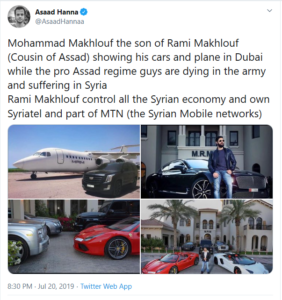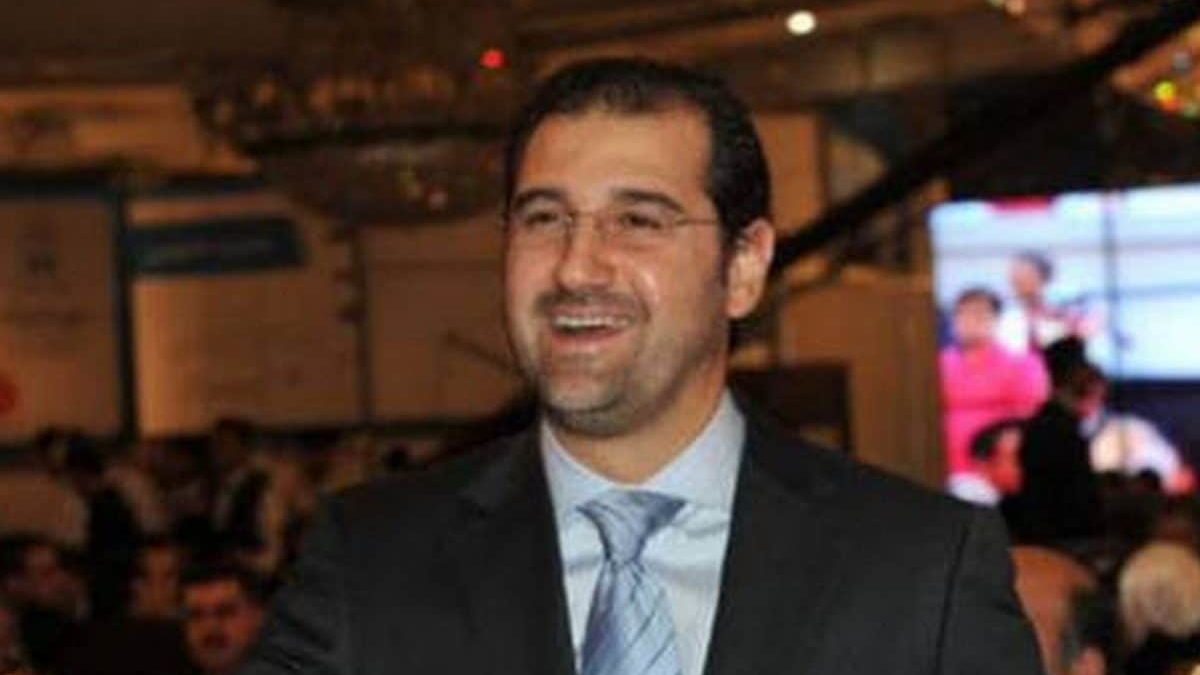Upheaval in Syria’s First Family No Surprise
Analyst: Stinging video by tycoon cousin and backer a ‘reflection of Assad’s quagmire’
Syrians watched in shock as billionaire Rami Makhlouf, Syria’s richest man and regarded as the business arm of the regime, spoke in Facebook videos and accused his cousin, President Bashar al-Assad, of ordering the seizure of his assets and businesses.
Makhlouf, 50, has been one of Assad’s biggest supporters, bankrolling the Syrian government since the eruption of the country’s civil war more than nine years ago. He owns the nation’s largest mobile phone company, Syriatel, as well as retail, banking and real estate companies.
In a rare display of opposition, he has now publicly questioned Assad’s takeover of his assets, exposing a major schism in the ruling family’s inner circle.
Dr. Ali Bakeer, an Ankara-based political analyst and an expert on Syrian politics, told The Media Line that reports of the internal family dispute were not new.
“The issue has been there for some time, but it surfaced now because of the videos…,” he said.
“It is an indication of increasing pressure by Assad on his cousin, but at the same time it is a reflection of the quagmire in which Assad finds himself,” Bakeer explained. “He is being torn by the two divergent agendas of Iran and Russia. Each of his backers would like to see its gamble paying off at this moment.”
Makhlouf did the unthinkable in Syria. Calling it “unjust,” he posted two emotional videos on social media, pleading and urging the president to cancel a state demand for a large tax payment.
“Today the pressuring has started in an unacceptable way…. The security agencies have begun arresting my employees,” Assad’s maternal cousin said. “Would anyone ever have thought that the security agencies would come for Rami Makhlouf’s companies while he has been their biggest supporter and sponsor throughout the war?”
Makhlouf’s unwavering support for the president has made him the target of US and EU sanctions. At the outset of the civil war in 2011, he controlled as much as 60% of the country’s economy.
Many say the videos confirm rumors of a rift in the close-knit family that does not normally air its dirty laundry in public.
The civil war has weakened the government in Damascus and caused Syria’s economy and infrastructure to collapse. The ongoing military operations have emptied the treasury, forcing Assad to look for ways to replenish it. That has put a strain on the relationship between the two men.
Dr. Ammar Kahf, executive director of the Istanbul-based Omran Center for Strategic Studies and a member of the Syrian Forum, told The Media Line that the years of fighting had exhausted the country.
“Finishing the military aspect of the war and having to deal with its aftermath – this is when the economic challenges come first,” Kahf said.
“The central government has been unable to [properly] manage its affairs,” he continued. “What took place in the last nine years is that the central government gave away a lot of its authority [over] its economic powers, [over] its social powers, to local groups. To warlords, to the war economy, to businessmen and to fighters.”
Another source of pressure is Russia. Moscow is a close ally of Damascus and it came to the aid of Assad in late 2015.
Obaida Hitto, a Turkey-based expert on Syrian politics, told The Media Line that were it not for Russia’s military assistance, Assad’s forces would have been defeated, adding that Russian pressure on the Syrian leader is behind the changes within the ruling family.
“Russia has suffered immense loses in Syria. The financial cost for Russia, added to the sharp drop in oil prices, makes things difficult,” he explained. “There have been significant losses to Russia’s Special Forces, Russian mercenaries, tanks, equipment. God knows how much money, too.”
With the COVID-19 pandemic and the collapse of world oil prices, Hitto says Moscow might now be rethinking its military involvement.
“Russia wants to turn its investment in Syria into something profitable. Until now, it’s been an investment in the future. It hasn’t been able to profit in any way from its investment. It wants to capitalize on the rebuilding of Syria,” he said.
“Russia,” he added, “basically is saying that it’s time for Bashar al-Assad to pay up.”
Makhlouf’s family maintains a lavish lifestyle. One of his sons was photographed standing among ultra-expensive cars in Dubai. The pictures caused an uproar in Syria, with many complaining that while the economy is crumbling, Assad’s relatives are living extravagantly.

A Twitter user complains. (Screenshot)
This resentment spread to the president himself, with critics accusing him of mismanaging the economy.
Russian media, which normally does not publish criticism of Moscow’s ally in the region, has come out with scathing reports.
“A few months ago, articles started to appear in Russian media about talk that Russia is trying to find an alternative to Assad,” Hitto said. “This didn’t happen until very recently, when some Russian publications put Assad through the meat grinder.”
Russia may be on the verge of losing patience and is pressuring Assad to take real steps to fix the economy and stop corruption, he said, adding: “Russians are saying that Bashar al-Assad is not living up to Russia’s standards.”
Moscow has spent billions of dollars on Assad and his military. It is entrenched in Syria – it built several military bases around the country in pursuit of its strategic geopolitical goals. Many say it has yet to get a return on its investment.
“Some of the accusations are that he was giving money to his cronies, he wasn’t taking care of the Syrian people like he was supposed to, and that Russia wasn’t going to continue bankrolling Bashar al-Assad’s life in Damascus and abroad,” Hitto said.
The Kremlin has been quiet on the matter, instead leaving it to its media, and is happy to see Assad and Makhlouf sweat it out. But according to Kahf, Moscow’s support for the regime remains strong, this merely being President Vladimir Putin’s way of sending a wake-up call.
“I don’t think it is a serious change of policy,” he explained. “I think it is a tactic to put extra pressure on the regime, to tell Bashar that we can get rid of you, we are able to drop our deals, but that the collapse of Bashar al-Assad or regime change in Syria is not supported by even one factor in Russia.”
Kahf also believes that Assad remains Moscow’s man in the region.
“Russia,” the analyst said, “sees him as the only one capable of delivering.”
Bakeer is skeptical of Moscow’s support for Damascus, saying that Russia is putting its own interests first.
“Although some suggest that Moscow supports Makhlouf in this feud, I believe Russia stands with itself and where its interest lies. Whether they are secured by Makhlouf or Assad, it doesn’t matter. It will end up using both Assad and Makhlouf to get what it wants,” he said.
Another element in this real-life soap opera, according to Bakeer, is Assad’s wife.
“Asma [al-Assad] is believed to play a role in [trying to] secure a Sunni alternative to Assad’s cousin Rami Makhlouf, which can play the same function but at the same time help the Assad regime financially,” he explained. “If this mission succeeds, it will strip the most powerful and richest man in Syria of the last of his privileges. That is why Makhlouf is resorting to religious and sectarian rhetoric in his videos in an attempt to rally Alawites behind him.”
Last December, the government froze the assets of several Syrian businessmen for tax evasion and illegal enrichment during the civil war. Kahf says that at this point, the regime, in an effort to survive, is going after anyone who has money.
“The government is… trying to take back some of the economic privileges it had given out, not only to Rami Makhlouf, but to many others,” he stated. “The main headline from the mindset of decision-makers in Syria – that is, Bashar al-Assad – is regaining control of all aspects of the state institutions, reestablishing state sovereignty, state institutions and economic power.”
Makhlouf and Assad are both members of the Alawite sect that makes up about 12% of the population and lives mostly in the coastal mountains along the Mediterranean. The Alawites have provided Assad with money and fighters in exchange for economic benefits.
Hitto says people there are now speaking up.
“In these areas, there has been a general sense of frustration toward Assad and his family members, including his extended family members,” he noted. “In the last two years, there has been a lot of discontent and dissatisfaction with how Assad is managing the funds he received from Iran and Russia.”
Bakeer adds that the discontent within the community can only grow.
“The fissure within the Alawite family is there, is serious, and is expected to widen in the coming period,” he said, “as a result of increasing pressure by Russia on Assad to deliver.”


